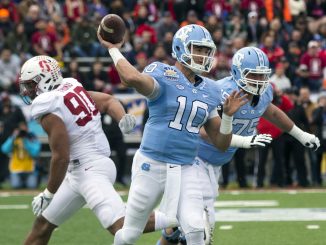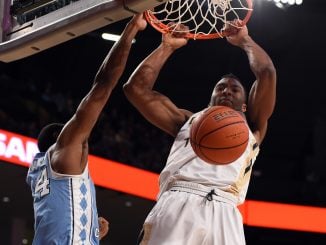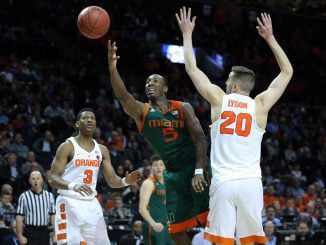
The NCAA has set the stage for its long-awaited showdown with North Carolina by scheduling a hearing date and reinforcing previously drawn battle lines in its seemingly never ending case against the Tar Heels.
UNC officials, including coaches Roy Williams, Larry Fedora and Sylvia Hatchell, will have two days to plead their case before the NCAA’s Committee on Infractions in Nashville on August 16-17. They are expected to respond to the five major allegations lodged against their program by arguing that academic irregularities involving UNC’s African and Afro-American studies department do not fall under the jurisdiction of NCAA bylaws.
It’s a position that was spelled out last month in the university’s reply to the NCAA’s third and most recent Notice of Allegations. The NCAA, however, rejected the Tar Heels’ assertion in a contentious rebuttal released by UNC on Tuesday.
“The issues at the heart of this case are clearly the NCAA’s business,”NCAA director of enforcement Tom Hosty wrote in a letter to UNC chancellor Carol Folt dated July 17. “When a member institution allows an academic department to provide benefits to student-athletes that are materially different from the general student body, it is the NCAA’s business.
“When athletics academic counselors exploit ‘special arrangement’ classes for student-athletes in ways unintended by and contrary to the bylaws, it is the NCAA’s business.When a member institution provides student-athletes an inside track to enroll in unpublicized courses where grades of As and Bs are the norm, it is the NCAA’s business.
“When a member institution uses ‘special arrangement’ courses to keep a significant number of student-athletes eligible, it is the NCAA’s business. When a member institution fails or refuses to take action after receiving actual notice of problems involving student-athletes, thereby allowing violations to compound and to continue for years, it is the NCAA’s business. In sum, it is an NCAA matter when other member schools who choose not to provide impermissible benefits are disadvantaged by their commitment to compliance.”
In the written reply accompanying Hosty’s letter, the NCAA indicated that its case against UNC is “not about so-called fake classes or easy courses” or its enforcement process — which the university has frequently criticized — but rather that the anomalous courses constituted an impermissible extra benefit under NCAA bylaws. The response pulled no punches, referring to UNC’s claim that the NCAA is overstepping its authority — especially in light of the fact that the university has already been sanctioned by its academic accrediting agency — as an “inflammatory distraction.”
UNC faces five Level I charges, including the most serious lack of institutional control, for academic irregularities that took place over an 18-year span from 1993-2011. The NCAA’s involvement in the case dates all the way back to July 2010.
“The hearing is the next step in bringing closure to this longstanding issue by allowing us the opportunity to address the Committee on Infractions and present the facts,” UNC’s vice chancellor of university communications Joel Curran said in a statement.
The NCAA is expected to issue a ruling on the case within weeks of hearing. But that might not be the final word in the continuing saga. Considering the strong wording used in the NCAA’s latest correspondence, combined with UNC’s vigorous defense, there’s a good chance the case will ultimately be decided in court. That would extend the process even further.
It’s a process that might already have been resolved had UNC accepted the findings of a softened Amended Notice of Allegations in April 2016. Such action would likely have resulted in a proverbial slap on the wrist, especially since men’s basketball and football weren’t specifically mentioned.
Instead the university decided to fight the findings, leading to a second Amended Notice in December that reinstated mention of the Tar Heels’ men’s basketball and football programs that were omitted from the previous version.



